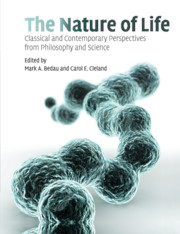Book contents
- Frontmatter
- Contents
- Preface
- Acknowledgments
- Sources
- About the authors
- Introduction
- SECTION I CLASSICAL DISCUSSIONS OF LIFE
- 1 De Anima (selections)
- 2 Treatise on Man
- 3 Critique of the teleological power of judgment (selections)
- 4 What is Life? (selections)
- 5 The nature of life
- 6 What is the meaning of “life”?
- 7 The principles of life (selections)
- SECTION II THE ORIGIN AND EXTENT OF NATURAL LIFE
- SECTION III ARTIFICIAL LIFE AND SYNTHETIC BIOLOGY
- SECTION IV DEFINING AND EXPLAINING LIFE
- Supplementary bibliography on life
- Index
1 - De Anima (selections)
Published online by Cambridge University Press: 10 November 2010
- Frontmatter
- Contents
- Preface
- Acknowledgments
- Sources
- About the authors
- Introduction
- SECTION I CLASSICAL DISCUSSIONS OF LIFE
- 1 De Anima (selections)
- 2 Treatise on Man
- 3 Critique of the teleological power of judgment (selections)
- 4 What is Life? (selections)
- 5 The nature of life
- 6 What is the meaning of “life”?
- 7 The principles of life (selections)
- SECTION II THE ORIGIN AND EXTENT OF NATURAL LIFE
- SECTION III ARTIFICIAL LIFE AND SYNTHETIC BIOLOGY
- SECTION IV DEFINING AND EXPLAINING LIFE
- Supplementary bibliography on life
- Index
Summary
DA II 1 T
[412a1] Let this much be said about what has been handed down concerning the soul by our predecessors. Let us start anew, as if from the beginning, endeavoring to determine what the soul is and what its most common account would be.
Among the things which are, we call one kind substance. Belonging to this is, first, matter, which in itself is not some this; another is shape and form, in terms of which something is already called some this; and the third is what comes from these. Matter is potentiality, while form is actuality; and actuality is spoken of in two ways, first as knowledge, and second as contemplating.
Substances seem most of all to be bodies, and among these, natural bodies, since these are the sources of the others. Among natural bodies, some have life and some do not. We mean by ‘life’ that which has through itself nourishment, growth, and decay.
It would follow that every natural body having life is a substance, and a substance as a composite. But since every such body would also be a body of this sort, that is, one having life, the soul could not be a body; for the body is not among those things said of a subject, but rather is spoken of as a subject and as matter. It is necessary, then, that the soul is a substance as the form of a natural body which has life in potentiality.
- Type
- Chapter
- Information
- The Nature of LifeClassical and Contemporary Perspectives from Philosophy and Science, pp. 9 - 14Publisher: Cambridge University PressPrint publication year: 2010

